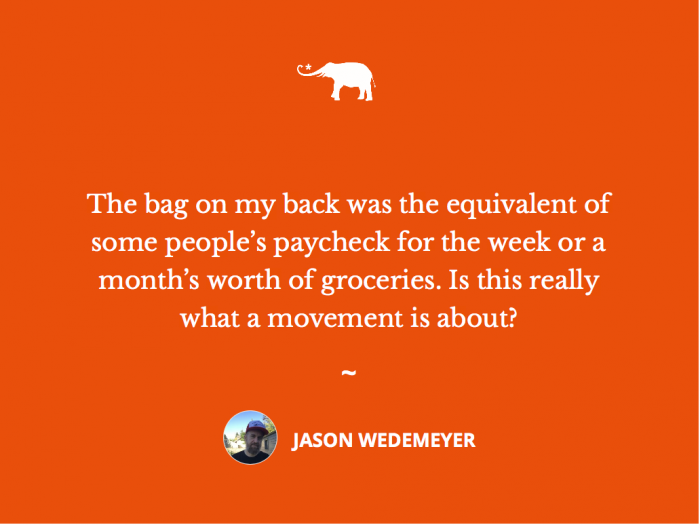View this post on Instagram
I ask myself often, am I doing enough to prevent further impacts from climate change? What else can I do?
A few years ago, I had a situation that showed me my privilege in relation to the green movement.
As climate change accelerates and the reckoning with racism in our country advances, there is no better time than now to examine our actions and privileges in order to make a significant change.
Back in 2013, after several years working for an environmental advocacy non-profit, I became a labor organizer in Philadelphia.
I went from organizing amongst the mesas and wildlands in Western Colorado to a city whose public schools were facing another funding and privatization crisis and threatening neighborhood schools across the city. I set out to work as an ally—a set of hands and ears to work alongside union members.
Philadelphians had been experiencing negative impacts in public schools, as each year, they were losing teachers, classroom assistants, nurses, and community services to draconian funding cuts made by state and local governments.
I was still an environmentalist, but my focus in my daily work had shifted to organized labor and education.
In one of my roles as an organizer, I was assigned to hand out literature each morning and after school alongside dozens of teachers in front of neighborhood schools in North Philadelphia. If you haven’t been to North Philly, you will see rows of redbrick rowhomes clustered together on the grid of narrow streets. You can look directly south and see the Center City skyline ascending upward.
I met the school’s teachers at 7:15 a.m. by the front door.
After we gathered and said good morning to each other, we took our places around the outside of the school to hand out pamphlets and sign up parents and the family members of students who wanted to take action on improving public schools.
The sun began to rise higher over the homes, lining the schoolyard.
Some of the parents were wiping sweat off their foreheads, and I was starting to feel the air warm on my arms and face. I didn’t need to look at the weather app on my phone to tell it was going to be another hot day.
As I wiped my forehead and finished my conversation with a parent about the upcoming rally in front of the school district office, he pulled a plastic water bottle out of the back pocket of his jeans and took a big gulp of water. He threw the bottle in the trash can by the front door of the school, turned to his daughter, and picked her up, leaving her with a smile and a kiss on the cheek. He turned, gave me a quick look, and then headed back down the street.
Before the next group of parents and kids made their way up the sidewalk toward me, I pulled out a double-walled, stainless steel water bottle out of my bike messenger bag. I took several gulps of the icy, filtered water and put it back in the bag.
I have a disclosure to make; this bag is one of those heavy-duty American-made bags that run around 250 dollars. I used it for carrying notebooks, campaign literature, a bike lock, phone chargers, and my stainless steel coffee cup. The water bottle and coffee cup would run anyone about 70 dollars at a local outdoor store.
I am sure more than a handful of the parents and teachers saw me juggling around my stainless steel, zero waste vessels when I was working at their school.
Later that same month, I was at a labor rally among thousands of activists taking the streets.
I was among thousands of people marching, many with signs, drums, megaphones, all chanting in unison. We were in Center City Philadelphia to protest a conservative Governor who took half a billion dollars from the public education budget and handed it to his contractor friends to build private prisons in the Keystone State.
It was extremely hot, with off and on rain. The dark asphalt seemed to be making more heat than the sun.
I had my messenger bag, this time carrying two refillable water bottles, my to-go mug, some gluten-free snack bars, and an umbrella. I was protesting school cuts amongst organized workers who marched the week before as an outcry to raise the minimum wage—a fight for 15 dollars.
Most marchers had no fancy bag, maybe a backpack, and were often carrying single-use plastic water bottles to stay hydrated—meanwhile, I’m hauling around 400 dollars worth of green goods on my back.
A colleague of mine spotted me digging around for a snack during a break in speeches at the rally. He saw my treasure trove I was carrying, shook his head, and said, “Prima donna.”
I didn’t like being called out in front of other organizers, but he was right. I was embarrassed. I owned it, I’m privileged, and I was standing out.
The bag on my back was the equivalent of some people’s paycheck for the week or a month’s worth of groceries. Is this really what a movement is about?
With the goal to get more people to practice zero waste, how can we make green goods more affordable and accessible? Here are three suggestions:
1. We can eliminate the accrual of personal debt from health care costs in the United States by having free to low-cost universal health care and by eliminating federal student debt.
2. We can raise the minimum wage at the federal level from 7.25 to 15 dollars (or even more).
3. We can give reparations to Black and Indigenous people who have had generations of suffering because of slavery and genocide—and the current systems of oppression.
That may open up more room for people to have cash for the double-walled water bottles, hybrid and electric vehicles, and clothing that is made from non-plastic fibers.
I know these are big starters.
There is more that we can do as white allies.
Another part, which is key, is to engage in dialogue beyond the white privileged folks, listen to ideas, and understand what people besides ourselves see as barriers to improving our environment.
If we understand the issues together, then perhaps our actions lead to less waste and less carbon on the planet. It’s about more than just buying cool sh*t, right?
~









Read 10 comments and reply